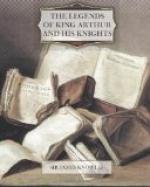“That shall he be,” said Arthur; “and never shall another hold that office, save thy son, while he and I do live.”
Anon, they left the church and went to the archbishop to tell him that the sword had been achieved. And when he saw the sword in Arthur’s hand he set a day and summoned all the princes, knights, and barons to meet again at St. Paul’s Church and see the will of Heaven signified. So when they came together, the sword was put back in the stone, and all tried, from the greatest to the least, to move it; but there before them all not one could take it out save Arthur only.
But then befell a great confusion and dispute, for some cried out it was the will of Heaven, and, “Long live King Arthur,” but many more were full of wrath and said, “What! would ye give the ancient sceptre of this land unto a boy born none know how?” And the contention growing greatly, till nothing could be done to pacify their rage, the meeting was at length broken up by the archbishop and adjourned till Candlemas, when all should meet again.
But when Candlemas was come, Arthur alone again pulled forth the sword, though more than ever came to win it; and the barons, sorely vexed and angry, put it in delay till Easter. But as he had sped before so he did at Easter, and the barons yet once more contrived delays till Pentecost.
But now the archbishop, fully seeing God’s will, called together, by Merlin’s counsel, a band of knights and gentlemen-at-arms, and set them about Arthur to keep him safely till the feast of Pentecost. And when at the feast Arthur still again alone prevailed to move the sword, the people all with one accord cried out, “Long live King Arthur! we will have no more delay, nor any other king, for so it is God’s will; and we will slay whoso resisteth Him and Arthur;” and wherewithal they kneeled down all at once, and cried for Arthur’s grace and pardon that they had so long delayed him from his crown. Then he full sweetly and majestically pardoned them; and taking in his hand the sword, he offered it upon the high altar of the church.
Anon was he solemnly knighted with great pomp by the most famous knight there present, and the crown was placed upon his head; and, having taken oath to all the people, lords and commons, to be true king and deal in justice only unto his life’s end, he received homage and service from all the barons who held lands and castles from the crown. Then he made Sir Key, High Steward of England, and Sir Badewaine of Britain, Constable, and Sir Ulfius, Chamberlain: and after this, with all his court and a great retinue of knights and armed men, he journeyed into Wales, and was crowned again in the old city of Caerleon-upon-Usk.
Meanwhile those knights and barons who had so long delayed him from the crown, met together and went up to the coronation feast at Caerleon, as if to do him homage; and there they ate and drank such things as were set before them at the royal banquet, sitting with the others in the great hall.




